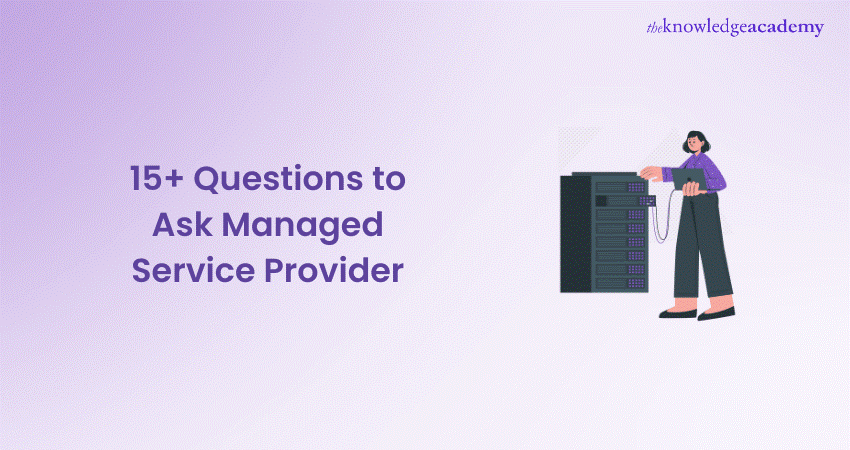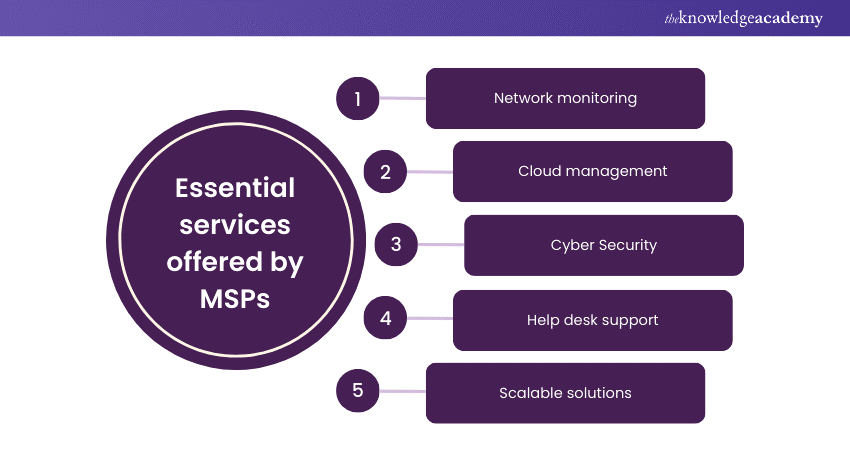We may not have the course you’re looking for. If you enquire or give us a call on +44 1344 203 999 and speak to our training experts, we may still be able to help with your training requirements.
Training Outcomes Within Your Budget!
We ensure quality, budget-alignment, and timely delivery by our expert instructors.

Selecting a Managed Service Provider (MSP) is not just about understanding their services but also about assessing their expertise, reliability, and alignment with your business needs. Now, let's delve into each of these Questions to Ask Managed Service Providers to understand their importance and insights.
Don't miss this opportunity to strengthen your IT management strategy. Continue reading to uncover the key Questions to Ask Managed Service Provider that will lead you to a successful partnership with a Managed Service Provider.
Table of Contents
1) Questions based on service offerings and capabilities
2) Questions based on experience and expertise
3) Questions based on pricing and contractual matters
4) Conclusion
Questions based on service offerings and capabilities
Following are the questions to ask to a Managed Service Provider based on service offerings and capabilities:
1) What services do you offer?
Every organisation has different IT requirements, so understanding the range of services provided by an MSP is important. Determine whether they offer essential services like as network monitoring, Cloud Management, Cyber Security, and customer support.

By ensuring that they meet your specific requirements, you can keep operations running effortlessly and efficiently solve any potential IT difficulties. Furthermore, ask if they have scalable solutions that can grow with your company, ensuring long-term support and flexibility as your IT needs change.
2) What security measures do you use?
Data security has become important in today's digital environment. Inquire about the MSP's security processes, such as encryption methods, detection systems for intrusions, and data backup procedures, to secure your confidential information from cyberattacks.
3) What is their business roadmap?
Understanding the MSP's goals and plans for the future might help you connect your IT goals with theirs. Inquire about their long-term strategy, technological roadmap, and innovation plans to ensure they can support your company's growth while adapting to changing needs.
4) Do you provide 24×7 support?
IT challenges may arise at any time, therefore 24/7 support is necessary for reducing downtime and ensuring company sustainability. Inquire about the MSP's availability, response times, and escalation protocols for managing problems outside of normal working hours.
5) What hardware and software do you recommend?
An MSP's hardware and software suggestions might have an impact on the efficiency and effectiveness of your IT infrastructure. Inquire about their recommended vendors, technological framework, and compatibility with your current equipment so that you may make informed improvements and investment decisions.
6) What use do they make of automation?
Automation can streamline IT operations, improve efficiency, and reduce manual workload. Ask about the MSP's use of automation tools, scripts, and workflows to automate routine tasks, troubleshoot problems, and proactively manage your IT environment.
7) What is out of their scope?
Knowing what services are not included in the MSP's offerings is just as important as understanding what is included. Ask about limitations, exclusions, and areas that fall outside of their expertise or responsibility to avoid misunderstandings and gaps in service coverage.
8) What is their disaster recovery/business continuity plan?
Automation can help improve IT processes, increase productivity, and minimise manual tasks. Inquire about the MSP's usage of automation tools, scripts, and workflows for automating everyday tasks, solving problems, and proactively handling your IT infrastructure.
9) Are they able to scale?
Scalability is necessary for managing corporate growth and responding to changing demands. Inquire about the MSP's scalability choices, capacity planning methodologies, and ability to move services and resources up or down as required without affecting your operations.
10) What is their offboarding process?
Transitions happen; therefore, it's important to understand how easily you can leave the MSP's services if necessary. Inquire about their offboarding process, data transfer methods, and legal responsibilities for finishing the contract to ensure an easy transition with no data loss or service interruptions.
Enhance your skills with our MSP® Foundation & Practitioner Training- sign up now!
Questions based on experience and expertise
Following are the questions to ask to a Managed Service Provider based on experience and expertise:
11) What is your experience and expertise?
Evaluating the MSP's knowledge and expertise provides insight into their ability to effectively handle your IT needs. Inquire about their experience, industry qualifications, and team members' expertise to make sure they have the necessary abilities to support your business.
Elevate your career with MSP® Practitioner Training for expert certification!
Questions based on pricing and contractual matters
Following are the questions to ask to a Managed Service Provider based on pricing and contractual matters:
12) What are your price options?
Understanding the pricing framework for a Managed Service Provider is essential for budgeting and cost-effectiveness. Inquire about their price models, including whether they provide fixed pricing, graded packages, or customised programmes aimed at your specific requirements.
13) Is there a service-level agreement?
A Service-Level Agreement (SLA) sets an MSP's responsibilities, performance indicators, and service delivery promises. Request a copy of their SLA and carefully examine it to ensure it meets your expectations and contains provisions for fines or recourse in the event of service failures.
14) How often is the contract renewed?
Understanding the renewal of contracts procedures is essential for long-term planning and budgeting. Inquire about the contract's terms, renewal decisions, and any conditions that control cost rises, service upgrades, and cancellations.
15) What is your pricing structure?
Clarifying the MSP's pricing structure helps avoid unexpected costs and budget overruns. Ask about any hidden fees, additional charges for extra services, and opportunities for cost optimisation or discounts based on usage or contract duration.
16) How will they reduce your costs?
Reduced expenses are a significant advantage of exporting IT services to an MSP. Inquire about their cost-cutting initiatives, such as combining infrastructure, reducing resource utilisation, using cloud services, and implementing efficiency improvements to maximise Return On Investment (ROI) while minimising Total Cost of Ownership (TCO).
17) What is your communication and reporting process?
Effective communication is necessary for a successful MSP-client relationship. Inquire about their communication paths, reporting frequency, and escalation methods for resolving problems and complaints quickly.
Advance your career with MSP® Advanced Practitioner Training- join now!
Conclusion
Treat every question you ask a Managed Service Provider as an opportunity to ensure they meet your business needs. Use this blog to confidently evaluate their expertise, reliability, and services. By asking the right Questions to Ask Managed Service Provider, you can secure the best MSP partnership for your company. Good luck with your selection process!
Enhance your project management skills with our MSP® Training today!
Frequently Asked Questions
Upcoming Project Management Resources Batches & Dates
Date
 MSP® Foundation & Practitioner
MSP® Foundation & Practitioner
Mon 6th Jan 2025
Mon 13th Jan 2025
Mon 20th Jan 2025
Mon 27th Jan 2025
Mon 3rd Feb 2025
Mon 10th Feb 2025
Mon 17th Feb 2025
Mon 24th Feb 2025
Mon 3rd Mar 2025
Mon 10th Mar 2025
Mon 17th Mar 2025
Mon 24th Mar 2025
Mon 31st Mar 2025
Mon 7th Apr 2025
Mon 14th Apr 2025
Tue 22nd Apr 2025
Mon 28th Apr 2025
Tue 6th May 2025
Mon 12th May 2025
Mon 19th May 2025
Tue 27th May 2025
Mon 2nd Jun 2025
Mon 9th Jun 2025
Mon 16th Jun 2025
Mon 23rd Jun 2025
Mon 30th Jun 2025
Mon 7th Jul 2025
Mon 14th Jul 2025
Mon 21st Jul 2025
Mon 28th Jul 2025
Mon 4th Aug 2025
Mon 11th Aug 2025
Mon 18th Aug 2025
Tue 26th Aug 2025
Mon 1st Sep 2025
Mon 8th Sep 2025
Mon 15th Sep 2025
Mon 22nd Sep 2025
Mon 29th Sep 2025
Mon 6th Oct 2025
Mon 13th Oct 2025
Mon 20th Oct 2025
Mon 27th Oct 2025
Mon 3rd Nov 2025
Mon 10th Nov 2025
Mon 17th Nov 2025
Mon 24th Nov 2025
Mon 1st Dec 2025
Mon 8th Dec 2025
Mon 15th Dec 2025







 Top Rated Course
Top Rated Course



 If you wish to make any changes to your course, please
If you wish to make any changes to your course, please


